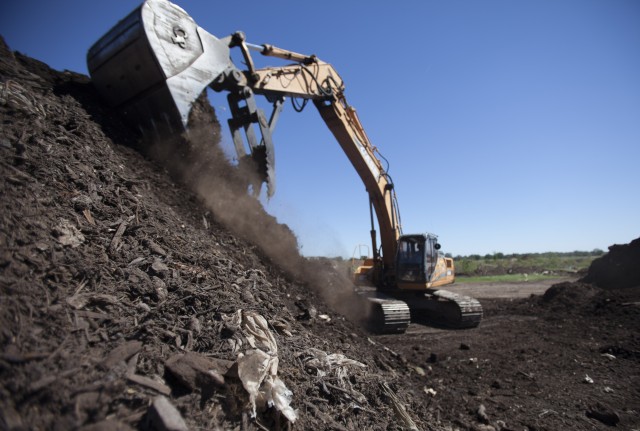Austin Will Expand Residential Composting Experiment

An excavator at Organics by Gosh handles composting material from Austin’s pilot program. Photo by Gabriel Cristóver Pérez.
By Barbara Zinckernagel
For Reporting Texas
The city of Austin has decided to double the size of its residential composting experiment, bringing the number of participating households to about 16,000 next year.
Austin Resource Recovery, the city division that collects garbage, has been picking up food scraps and other biodegradable material from 7,900 residences since January. Another 8,000 will be added in February. The residential pilot project is part of the city’s effort to reduce waste going to landfills by 90 percent by 2040.
Through mid-October, processing of food waste and other organic material into compost by a private contractor was going smoothly, but the program has had problems with collections. About 30 percent of the 7,900 households are leaving compostable materials for city pickup, compared with 72 percent who leave materials to be recycled. Contamination has been a problem, too, with many customers mixing in plastic bags and other material that can’t be composted.
Project staffers said they’re confident those problems can be solved. The City Council is expected to consider taking curbside composting citywide in 2016.
“We haven’t experienced any problems to stop us from going citywide,” said Bob Gedert, director of Austin Resource Recovery.
Austin has a long relationship with compost. The city has been processing yard trimmings into a popular compost called Dillo Dirt since 1989. Beginning in 2016, city rules will require restaurants to compost their food waste.
The composting company that handles food waste for the current pilot, Organics by Gosh, processed 1,438 tons of material from January through September, said Lauren Hammond, a public information specialist at Austin Resource Recovery. The company doesn’t charge the city for anything except inorganic material that can’t be composted.
“We have paid $30 so far,” said Emlea Chanslor, marketeting manager and public information officer at Austin Resource Recovery. “Some invoices have not been processed yet, but even adding those, it will be less than $500 in nine months.”
Organics by Gosh will initially handle the 8,000 households added in February, Chanslor said. Other composting firms will be allowed to bid on the project when the current contract runs out in spring 2014.
“We may charge the city in the future, but not within this contract,” said Pat Whited, sales manager at Organics by Gosh.
As the project expands, city staffers will try to get more people in the collection areas to save their organic waste for composting. Fewer than a third of the initial 7,900 households have been using their green bins to leave compostable waste each week, Gedert told the city’s Zero Waste Advisory Commission on Oct. 9. Gedert said customers who are participating are leaving four or five pounds of waste a week, less than the 10 to 12 pounds the city had expected.
“We are disappointed with the volumes that are collected; we anticipated collecting higher volumes and having higher participation in general,” Gedert said in an interview.
The city also will try to educate customers on what can’t be composted. Plastics and other inorganic material have to be removed before composting can proceed.
“Contamination the first two weeks was terrible, but we got back to the residents, and the level is about 5 percent right now, which is acceptable,” Gedert said. “Our goal is to get below 1 percent, so we just keep hammering away with the ‘no plastic bags.’”
Gedert said the project is within its budget, $485,000 for the first year’s operation, and that he expects the City Council to consider taking the composting program citywide as soon as 2016.
“Council members are always concerned with price tags, but so far we have heard no negative thoughts,” he said. “What it is really about is learning to do it the right way before we go citywide.”